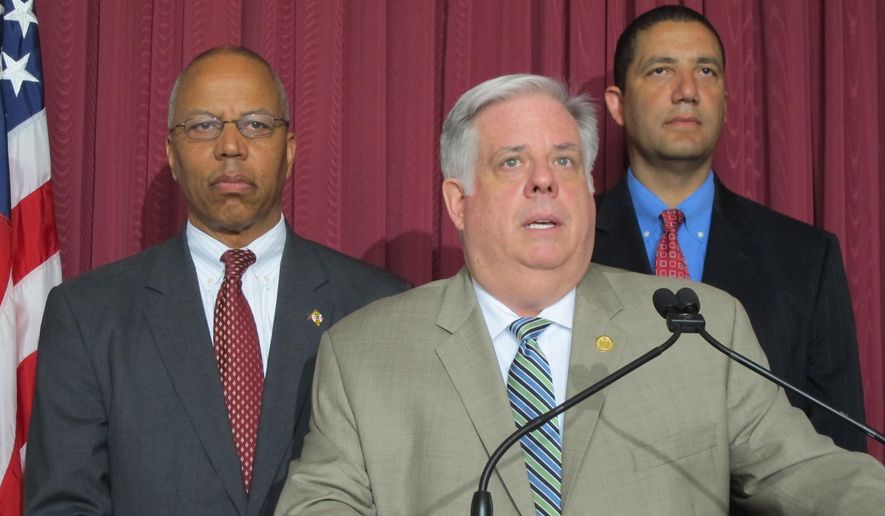Maryland’s redistricting commission fight has turned the usual politics upside down, with Gov. Larry Hogan breaking the Republican mold and backing a plan to let an independent panel redraw the lines — and Democrats vehemently fighting him.
With some of the most gerrymandered congressional districts in the country, which heavily favor Democrats, Mr. Hogan has called for a study to write a constitutional amendment that would establish an independent panel, figuring it would draw maps more fair to minority-party Republicans.
“The fact is that an overwhelming majority of Marylanders favor an independent, nonpartisan panel for redistricting over the existing biased process,” Mr. Hogan said.
But Democrats, who in other states usually have been the ones pushing independent commissions, are less eager in Maryland, where they are reluctant to have their gains undone.
Senate President Thomas V. “Mike” Miller Jr., a Democrat from Charles, Calvert and Prince George’s counties, said he would prefer to wait until the issue is addressed nationally so Maryland doesn’t leap before other states do.
Mr. Hogan’s attempt to redistrict is “a chapter out of the Republican governors’ playbook,” Mr. Miller told The Baltimore Sun.
Mr. Hogan has offered Mr. Miller and House of Delegates Speaker Michael E. Busch the opportunity to appoint someone to the current 11-member commission. Both are expected to take the offer and submit names.
“We have a few names of House members that the speaker is considering but wants to be sure that he balances jurisdiction with the president,” said Alexandra Hughes, Mr. Busch’s deputy chief of staff. “Long and short, I believe we will announce the specific name jointly with the president.”
The study panel is charged with drafting a constitutional amendment by November. Mr. Hogan then will likely polish it and submit it to the legislature, which will have to approve sending it to voters for ratification.
The Supreme Court recently rejected a challenge by the Arizona Legislature, which said the Constitution requires legislatures, not commissions, to be in charge of the maps.
More than a dozen states use commissions to some extent to determine their lines, according to the National Conference of State Legislatures. They include Arizona and California, with panels completely independent of elected officials. Five states have commissions that can include elected officials, three states have advisory commissions to assist the legislature and two states have commissions serve as a backup if the legislature stalemates.
In Maryland, Democrats outnumber Republicans 2-to-1 in voter registration and occupy seven of the state’s eight House seats.
The reverse is true in other states where Republicans had more power over the lines, such as Virginia, Ohio, Florida and North Carolina.
“[Redistricting] is a political problem,” said Jennifer Bevan-Dangel, executive director of Common Cause Maryland, an election reform group. “Right now, insiders control the process and the public is completely excluded. In Democratic states, it’s Democrats. In Republican states, it’s Republicans. Getting politics out and the people back in is exactly what an independent commission would do, and that’s what we support.”
Common Cause Maryland supports the idea of an independent commission, and a member of the group’s board of directors, Michael J. Goff, will serve on the study.
The next time district lines will be drawn is 2021, so the goal is to finish the redistricting commission amendment and establish the panel by then, Ms. Bevan-Dangel said.
There hasn’t always been political upheaval when states use independent commissions to redraw their districts, Ms. Bevan-Dangel said.
FairVote, another election reform group, also supports the governor’s plans but wants even bigger changes to how House lawmakers are chosen.
Michelle Whittaker, communications director at FairVote, said they would like the state divided into two large districts, one with three representatives and the other with five.
Voters would be able to rank their top candidates in order of preference, which then would be used to pick the winners.
“The independent commission is a great start in being able to address gerrymandering, but this governor has to look beyond this and look at new and different models of voting systems, fair representation voting systems that give the power back to the voters in Maryland,” Ms. Whittaker said.
• Anjali Shastry can be reached at ashastry@washingtontimes.com.




Please read our comment policy before commenting.